
Unity Bank Plc has said it is currently on the verge of finalising a memorandum of understanding (MoU) that will lead to capital injection into the bank to boost expansion and market competition.
The Managing Director/CEO, Mrs. Tomi Somefun, who said this yesterday, during an interaction with journalists in Lagos, however did not give details about the partners involved in the deal.
She said: “All I can assure you is that this time around, it is very clear. It is not Milost. All I can say is that one of the parties is the second largest infrastructure finance institution in Asia.
“Though we have closed the process, some of the parties we had engaged before are saying they want to invest, because now we look good. Two years ago, we were the one chasing them. But we have told them to wait until we close this deal and any other party that wants to join, we can talk under different arrangement.
“The bank in the last three years has given the issue more attention than has ever been done in the history of Unity Bank as an entity. You are aware of the unfortunate Milost issue.
“We are still in discussion with different partners. We are concluding an MOU with some parties that we have selected and they are credible and serious parties.
“We have done all the due diligence and what is left is procedural or finalising that engagement. And because the Central Bank of Nigeria (CBN) has seen what we are doing, they appreciate the efforts we are making, and we have been carrying them along.
“So, I would call the incidence with the Nigerian Stock Exchange (NSE) last week an unfortunate one, because we had intimated the NSE about what we were doing, and we explained to them that the strategy was to finalise our MoU with prospective investors.”
Regarding the huge losses suffered by the bank in the 2017 financial year, Somefun explained: “We sold off the remaining of our bad loans. In fact, the business of this bank almost became debt recovery. We found out that we were spending so much time on debt recovery, so we decided to sell the legacy non-performing loans (NPLs) in 2017. We also wrote the goodwill that was in the books as at the time of the merger. All of that put us in negative of N14 billion losses.”
She further clarified that the NSE sanction leading to the suspension of trading on Unity Bank shares on the floor of the Exchange, was because the bank was waiting to conclude with the MoU before releasing its result.
“Also, because of the sale of the NPLs, the CBN wanted to be sure that those accounts were not performing. Unfortunately, the NSE decided to take that action on November 1, and immediately we complied, we were reinstated.”
Despite its turbulent path to growth, Somefun insisted that: “Unity Bank has not recorded the kind of recognition, public acceptance and diverse patronage it has enjoyed in the last three years.”
She added; “However, you will not see a reflection of that in the revenues because of the challenges of huge NPLs we had to contend with.
“When you don’t have a good loan book and you don’t have the capital to lend, you have to become creative and do things that your limited capital and resources allow you to do.
Credit: The Guardian.






